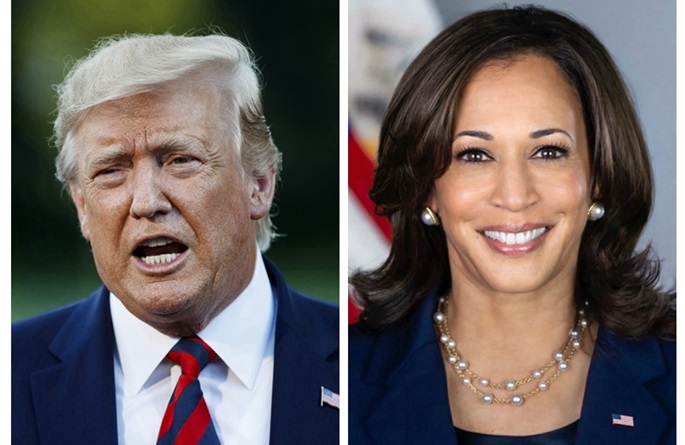As Rust Belt on edge, America braces for Election Day
Published : 05 Nov 2024, 02:15
Autumn in the Rust Belt brings crisp air and vibrant foliage along midwest highways, which are also dotted with towering billboards showcasing rival campaign slogans.
One, for instance, goes, "Trump 2024! Democrats won't work for us;" and another contends, "Kamala Harris. Voted to: Expand Medicare, Reduce drug prices, Cut taxes for working families," reported Xinhua
The Election Day is a pressure cooker. With over 330 million people and 161 million registered voters across 50 states, the result of the U.S. 2024 presidential election hinges highly on just seven swing states. Among these states, Pennsylvania, Michigan and Wisconsin, all in the traditional industrial heartland known as the Rust Belt, are seen as pivotal.
In Saginaw County, a bellwether of Michigan where voters swung from Trump to Biden four years ago, the stakes could not be higher, especially for the American auto industry.
J.D. Vance, Trump's running mate, addressed a crowd in Saginaw Township Tuesday, accusing Harris of trying to "kill the American auto industry," while showcasing Trump's promise to slap tariffs on foreign cars unless they permit Michigan vehicles to "sell all over the world."
The Harris campaign, however, points to the substantial federal investments directed at Michigan auto plants, including a recent 500 million-U.S. dollar grant to convert General Motors' Lansing plant into an EV assembly line, highlighting the move as a necessary transition to keep American automaking competitive.
The vice president, who argued that she is the best pick for the future of manufacturing in Michigan, made three campaign stops within 24 hours in the state on Oct. 28, including a semiconductor factory, a union training center and a rally near the University of Michigan campus targeting young voters accepting higher education.
The Democratic and GOP presidential candidates, each contending that their approach alone can sustain Michigan's industrial backbone, present starkly different visions for its future, local analysts said.
For many voters in Michigan, who feel growing unease about the days ahead, these industry stakes underscore what they view as deeper divides across the nation.
"People have just really gotten into very hardened positions on both sides ... The kind of trust that maybe we used to have, it seems to be very limited right now," local resident Camille Orso told Xinhua, recalling that since the 1960s when civil rights and anti-Vietnam War protests carried the country, public trust in U.S. institutions has been declining.
Lamenting the lack of civility in today's U.S. politics, she said, "Trump and his supporters have fed on that and try to increase distrust and fear on people who are not like them."
As if echoing Orso's remarks, John Franks, a low-income voter with health issues living in Saginaw County, voiced the deep-rooted distrust of the political establishment in an interview with Xinhua.
"Our state is corrupt and it has to change," said Franks, "I think he (Trump) opened our eyes to see how corrupt our government actually is." Franks voted for Trump in the past two elections and firmly believes the 2020 election was "stolen" from the third-time Republican nominee.
The loyal Trump supporter added that he is not sure if he would accept a Harris victory after the elections.
"It depends," he said, "Hard to say really because we all know that there's shenanigans in our corrupt political establishment. People that count the votes aren't very accurate. How is it when dead people can vote? When they're counting dead people's votes, that's a problem."
"Locally, state and national level we are divided," Franks continued. "What has divided it? I think the people that have an understanding for what the American dream once was and what the American dream has become."
Deeply frustrated with inflation, exorbitant drug prices and rapidly rising house costs under Biden-Harris administration, Franks said he will vote for Trump as he can make America great again, which in his eyes means a "cheaper America" so that ordinary people can afford living.
"There is no dream. People are having to choose between medications and food. It's unacceptable. There needs to be a change and without it we're going to have problems," he said.
Cyrena Matingou, an African American graduate student who voted early for Harris, agreed that the upcoming election is less about Trump. She focuses more on the actual policies like reproductive rights, inflation and the cost of daily living.
"These are issues that everybody in the United States is facing," she said. "I do think that there are other bigger issues that will affect us as a country for the long term and how our position in the world and how we're interacting with other countries."
In case of potential post-election unrest, Matingou said, "I have heard, especially in Michigan, that some people are kind of getting ready, if Trump doesn't win, they're likely gonna riot in the street."
"But I'm hoping that people have common sense and don't do that," said the young woman. "I'm really hopeful that people are not kind of going out and being crazy."
Though divided by ideology, voters share a common sense of anxiety about the future.
"Everyone is anxious in America, because the Democrats want Kamala to win. We want Trump to win," said Susan Simcox, a middle-aged woman, outside Vance's rally in Saginaw Township.
However, she said that no matter whether a Democrat or a Republican, everyone's concerned about two topics: safety and the economy.
The partisan divide is real and wide, but in the end, their real concerns are the same things, she concluded.


